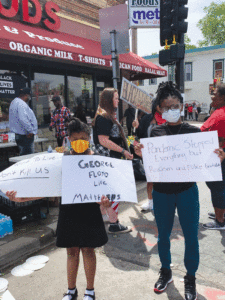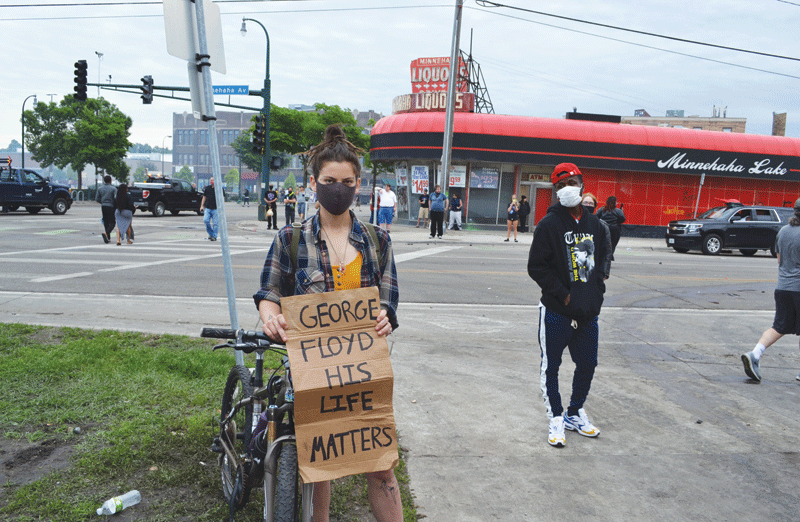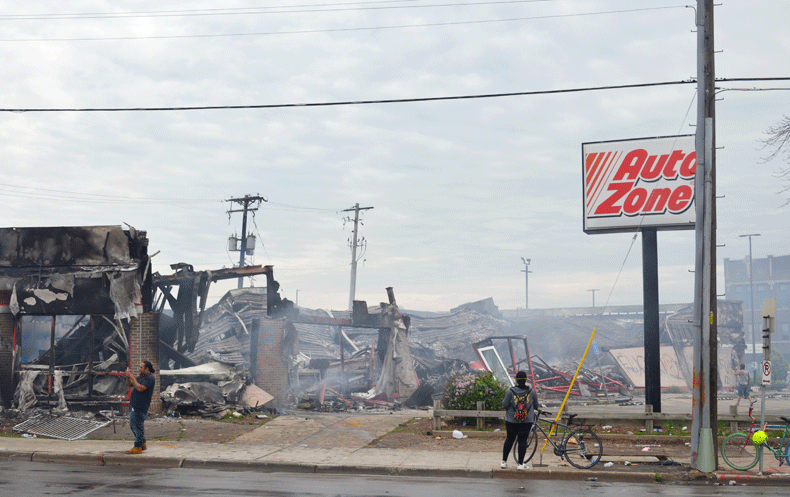“Certain conditions continue to exist in our society, which must be condemned as vigorously as we condemn riots. But in the final analysis, a riot is the language of the unheard.” — Rev. Martin Luther King, Jr.
In October 2017, I interviewed a young politician running for mayor of Minneapolis. The conversation with Jacob Frey, then a member of the City Council, moved to the issue of marked racial disparities in the Mill City. For many years, activists and scholars have pointed out the large gaps between whites and people of color in unemployment, income and homeownership, etc.
Frey said, “Every facet in my platform incorporates a lens of racial equity. Affordable housing — we know that communities of color are disproportionately deprived of housing… we’ve lost 10,000 units of affordable housing in just the last 15 years, and it’s not like things were rosy in 2002.”

In a story that ran in the Oct. 20, 2017 edition of the Jewish World, Frey emphasized that it’s not just a matter of rhetoric or philosophy, but rather “putting our money where our mouth is. Everybody deserves to live in a great city, and that is very quickly not becoming the case.”
I wrote: “Minneapolis, and the greater Twin Cities, have been roiled over recent years by the police killings of unarmed black men —notably, the cases of Jamar Clark, in north Minneapolis, and Philando Castile, in Falcon Heights.”
Frey also commented, “I believe in police accountability, and we know that communities of color, specifically, black men, are not always treated fairly by our police.”
The man who would end up winning the Minneapolis mayoral race in 2017 said he advocated for “more extensive implicit bias training.” He also mentioned that police need better training in how to exhaust all alternatives before resorting to deadly force.
“I believe there should be a rebuttable presumption of misconduct, if the officer fails to turn on the body camera and something bad happens…. A lot of times, race comes into play in all these issues.”
Of course, Frey’s words sound naïve now, especially in light of the May 25 police murder of George Floyd, a 46-year-old African-American man. Floyd was detained on suspicion of passing a counterfeit $20 bill, according to an initial statement from the Minneapolis Police Department. Cops pulled him from a van parked by Cup Foods, a convenience store on Chicago Ave. and 38th St. He was handcuffed and then moved next to a police vehicle on Chicago. A viral video taken by Darnella Frazier focused on Minneapolis police officer Derek Chauvin, who had his knee on the handcuffed man’s neck for nearly nine minutes, including about three minutes after Floyd was unresponsive.
For two days, the video was viewed by people around the world, and anger turned to rage in Minneapolis and in dozens of other U.S. cities where protests and riots broke out. On the day after the police murder of Floyd, I saw a photo someone took from another angle that showed three cops on Floyd; in addition to Chauvin, an officer had his knees on Floyd’s back and another was holding his feet. A fourth cop stood nearby, keeping back bystanders who were pleading with Chauvin to get his knee off Floyd’s neck, as the handcuffed man repeatedly cried out, “I can’t breathe.”
In an effort to calm the mounting anger in Minneapolis, Hennepin County Attorney Mike Freeman charged Chauvin with murder and manslaughter, and the cop was arrested. The other three officers, accessories to the murder of Floyd, have not been charged as yet. And this week we learned that the actions were homicide; according to two autopsy reports, the pressure on Floyd’s back and neck led to asphyxiation.
We grieve along with Floyd’s family members and loved ones, who know that this was an easily preventable death. And, as residents of South Minneapolis, we are dealing with the devastation caused by several nights of rioting, in which dozens of stores were looted and some 87 buildings were torched. The Target, Cub and Aldi stores across from the Third Precinct house, on Lake Street and Minnehaha Avenue, were looted. As a story in the Tuesday edition of the Star Tribune pointed out, the area is now a “food desert.” In other words, working people without cars are in a fix as far as buying food and other household items. The restrictions relating to the COVID-19 pandemic have now gotten more severe in the aftermath of the George Floyd killing.
I’ve seen the devastation on East Lake Street. I’ve seen gutted restaurants and shops, many owned by people of color and immigrant families. In some cases, they put all of their money and time into running these shops, which have been thoroughly trashed or reduced to cinders.

I used to produce radio reports for “First Person Radio,” a project of Migizi Communications. Migizi’s facility on Lake Street was hit by arsonists, which will curtail their news media training program for Native and minority youth in South Minneapolis. Other social service agencies suffered damage to their offices during the carnival of destruction that was perpetrated in the last week of May.
The vandalism and arson goes counter to the wishes of George Floyd’s family and members of the black community mainly. Likely, George Floyd would not approve of the wanton destruction, either. And there is mounting evidence that some of the arson attacks were perpetrated by people who traveled here from other states to exploit the protests, and, specifically, by people affiliated with white supremacist groups.
Folks in South Minneapolis are overwhelmingly enraged by the murder of George Floyd and want to see justice done. Apart from the annoyance of helicopters droning overhead and the acrid smoke from building fires, we and our neighbors will persevere. On the last weekend of May, hundreds of people came to East Lake Street with brooms, rakes and shovels and helped clean up the broken glass and debris. And in a shining example of social anarchism, neighbors also organized security arrangements — in the absence of municipal police and fire service — and collected mountains of food for those in need.

But we’re not out of the woods yet. Only one of four cops involved in the heinous crime on May 25 has been charged. What will happen if the cop charged with murder is acquitted?
I also want to mention that the large gatherings to protest the murder of George Floyd are happening in the midst of the COVID-19 pandemic, which will be altering the way we live for the indeterminate future. It was frightening to see people gather in large crowds, at the Capitol and in front of the governor’s residence in St. Paul, for example, without any regard for social distancing.
So, there is a novel coronavirus pandemic and a racism pandemic threatening our society. On the political front, we must prioritize the dismantling of systemic racism, which is baked into a nation built on the back of slaves and the dispossession of Native peoples.
When I was a child, American apartheid, the Jim Crow system in the South, was a fact of life. And when I was 12, I saw a paperback book in the grocery store, a book with large bright orange and red type on a black background: THE FIRE NEXT TIME / JAMES BALDWIN — James Baldwin, the celebrated African-American novelist and essayist.
When I think back on 50 years of political activism, I recall my younger self transfixed before this book on the rack of paperbacks in a Highland Village supermarket. In some mysterious way, it set me on a lifelong course of pursuing racial and social equity. At some point, this was tied to my Jewish upbringing and the idea of tikkun olam, repairing the rent fabric of society. As a teenager, in 1968, I boarded a bus for Milwaukee, along with other teens and U of M students, and spent a weekend participating in open housing marches led by a charismatic Catholic priest, James Groppi, and members of the Milwaukee NAACP Youth Council. We slept in a parish church basement, and I gained my first deep experience of human solidarity for a cause grounded in social uplift.
As a journalist over the past 40 years (including 25 years at the Jewish World, as of this month), I’ve reported mainly about movements for change — civil rights, antiwar activism and the struggle for recognition of American Indian treaty rights, where fights over the land sometimes lead to confrontations and the violation of human rights.
Getting back to the activist and author James Baldwin, we can now see him as a true prophet, albeit one without honor in his own town many years ago. Baldwin left the U.S. and lived in Paris and the south of France for much of his adult life.
In one essay published in The Fire Next Time, Baldwin reflected on the causes of urban riots — which in the 1960s were referred to as “race riots.” He wrote that America “has failed to hear that the promises of freedom and justice have not been met. And it has failed to hear that large segments of white society are more concerned about tranquility and the status quo than about justice, equality and humanity. And so in a real sense our nation’s summers of riots are caused by our nation’s winters of delay. And as long as America postpones justice, we stand in the position of having these recurrences of violence and riots over and over again. Social justice and progress are the absolute guarantors of riot prevention.”
In the case of unrest in Minneapolis and across the nation, nothing will change until white supremacy is dismantled, and the police stop murdering black men and other people of color with impunity. It’s up to each of us to determine how to contribute to this project.
And we can apply the words of Rabbi Tarfon to what lies before us in this challenging time: “It is not for you to complete the work, but neither are you free to stand aside from it” (Pirkei Avot 2:21).
Mordecai Specktor / editor [at] ajwnews [dot] com
(American Jewish World, June 2020)




















Comments 1